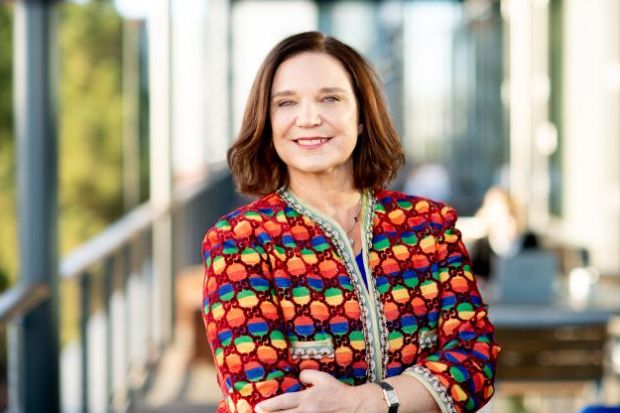When Ann Harrison first arrived as dean of Haas Business School at the University of California, Berkeley, one of the first things she noticed was how different the campus community looked compared with the state of California, where 50 per cent of high school students are from Hispanic backgrounds.
Given the top-ranking school’s reputation for creating the next generation of business leaders – and sending students straight to Wall Street – Harrison says she soon realised that she could have a huge impact on social mobility in post, but it was going to require some radical changes.
The economist’s ambitious diversity strategy has focused on three areas: representation, the curriculum and belonging. She describes changing her board to add people from under-represented groups, embedding diversity officers into areas such an admissions and doubling the number of scholarships available.
Thanks to natural turnover, the make-up of the senior leadership team has also changed and a “huge growth spurt” allowed her to expand the number of faculty, hiring nine new members of staff, of which seven are women and two are from a black or Hispanic background.
The changes still have a long way to go; Haas now has 30 per cent female representation among faculty, better than the 20 per cent that is average among business schools but still far from parity. However, Harrison believes she has signalled her intent to create waves.
Determined to change
Haas, Harrison says, has a mission to “not just tinker with business education but transform it” and inclusivity is one of the central aims in this regard, alongside innovation and sustainability. All three complement and interact with each other, she says, as “innovation drives economic growth and that transformation is what allows us to make it inclusive – to share it with the rest of the population – but without sustainability none of that is meaningful.”
Central to the new ethos is the idea that such agendas should not just be the responsibility of specialists alone and that means embedding it into what every student learns.
Therefore, all students taking a master’s in business administration (MBA) are required to take a course on diversity while those studying accountancy, operations or marketing are asked to consider the environmental impact of what they are learning.
Harrison – who has worked for the World Bank and now sits on an advisory board for the United Nations – believes that such changes are necessary particularly because it is increasingly businesses rather than governments that appear to be leading the fight against the huge issues the planet faces.
But this does not mean it is easy and she likens her role to that of a politician; “Universities are big bureaucracies, and you really have to be determined if you want to change things. You are essentially a politician and for politicians to make significant change they have to be so determined.”
What crisis?
Such transformative ambitions are also easy to let slip when faced with more immediate concerns. Enrolments in the traditional two-year full-time MBA – once the bread and butter of business schools – have stalled, particularly in the US where a buoyant jobs market has made the switch from work to study less appealing for many of the top prospective students.
In recent years, many schools – including Purdue University’s Krannert School of Business and Penn State's Smeal College of Business – have announced plans to shut residential MBA programmes entirely, leading some commentators to proclaim that the MBA degree is “in crisis”.
Harrison says the upheaval is more indicative of a realignment in the market to better reflect what students want and says a proliferation in new options such as undergraduate degrees, online courses and more specialised master’s programmes means that far from declining, business education is actually growing in popularity worldwide.
Haas’ own specialised programme in financial engineering is likely to expand soon, she says, and the school has just launched its first remote MBA, called flex.
The programme, which took on its first cohort this semester, sees core courses taught in virtual classrooms, with students coming together in-person only four times a year. In their second year, students will be given an option of remaining remote or relocating to campus.
“What we didn’t realise is how much demand there would be,” Harrison says. “We’ve had three times as many applications for the remote course as for the in-person one and it is priced exactly the same.”
The MBA, Harrison says, has “gone global without really intending to” and applications from international students have also supplemented some of the declines in the domestic market, with students from India, China, Chile, Brazil, Mexico and Canada all adding to the international make-up of this year’s intake.
Harrison points out that such a pivot to remote learning will only benefit her inclusivity plans, with students who work or have families able to access the school’s courses from wherever suits them.
The huge costs involved remain a barrier, however. A part time MBA at Haas costs $3,533 (£3,056) per unit, and students require a minimum of 42 units to graduate.
Students, Harrison says, know the value of investing in their education and most pay back their loans in “two or three years”. Evening and weekend students tend to already be working in fields such as technology and “they are able to get the job they want even before they graduate, it is a great mobility vehicle for them,” she says.
While scholarships have focused on students studying at undergraduate level or full-time MBAs, Harrison says Haas is starting to fundraise to support students on the part-time courses as well but admits, as a public institution, “we are definitely behind private colleges in offering scholarships. I’ve had to take the money out of my revenues, not our endowments.”
Asked what is driving the changes in business education, she says the students themselves are often the first to speak up but nothing would be possible without buy-in from the top.
“To change our board, to change our admissions practices, to double scholarships, the leader has to be 100 per cent on board…I’m definitely an activist,” she says.
“I’m at the end of my career so I can do just what I think is right. University leaders are not rewarded for making waves but that’s what I find really interesting and exciting about the role. A better strategy is to lie low and not create ripples but I don’t find that very interesting personally.”
tom.williams@timeshighereducation.com
This is part of our “Talking leadership” series of 50 interviews over 50 weeks with the people running the world’s top universities about how they solve common strategic issues and implement change. Follow the series here.
Register to continue
Why register?
- Registration is free and only takes a moment
- Once registered, you can read 3 articles a month
- Sign up for our newsletter
Subscribe
Or subscribe for unlimited access to:
- Unlimited access to news, views, insights & reviews
- Digital editions
- Digital access to THE’s university and college rankings analysis
Already registered or a current subscriber? Login








